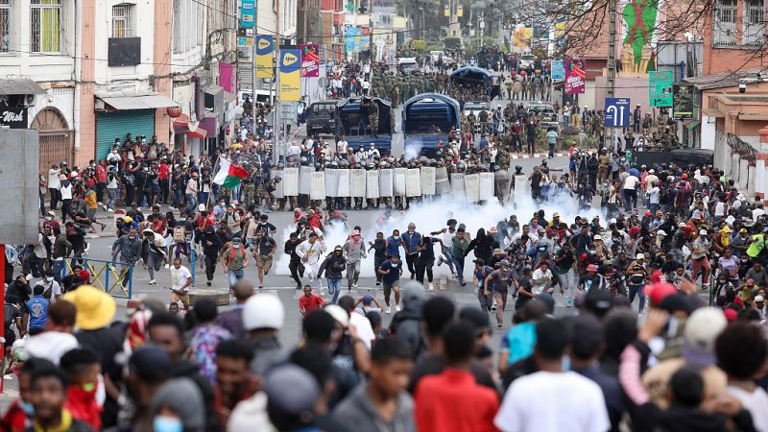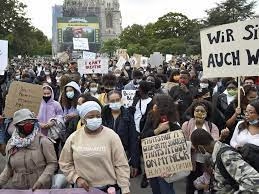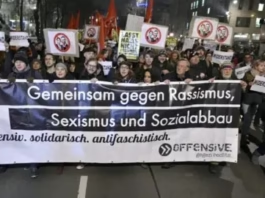Understanding the Current Situation in Madagascar
Madagascar has recently witnessed a wave of protests that began on September 25, primarily spearheaded by the youth. These demonstrations are rooted in various socio-economic challenges and a pervasive sense of political dissatisfaction among the populace. Young people, who comprise a significant portion of Madagascar’s population, have taken to the streets to voice their frustrations over issues such as high unemployment rates, inflation, and inadequate access to quality education and healthcare.
The youth’s engagement in these protests can be attributed to their discontent with the current government’s handling of these critical issues. Many feel that the political leadership is out of touch with the realities faced by everyday citizens, particularly younger generations who are struggling to secure a stable future. The protests have grown in intensity as demonstrators demand not only social reforms but also greater accountability from their leaders.
Tragically, amidst these peaceful protests, there have been alarming reports of violence, resulting in the loss of both life and property. Incidents of clashes between protestors and law enforcement, as well as the destruction of public and private property, have underscored the potential for unrest to spiral out of control. These occurrences reflect the dire need for dialogue between the government and the public, especially since the underlying issues have remained unresolved for some time.
The implications of the current unrest are significant, not just for those directly involved but for the nation as a whole. The protests serve as a stark reminder of the frustrations harbored by the youth and the broader population. Should the government fail to engage meaningfully with these demonstrators and address their concerns, the unrest could escalate, leading to further instability in Madagascar’s political landscape.
The Role of the Secretary-General and International Response
In response to the ongoing protests in Madagascar, United Nations Secretary-General António Guterres has articulated profound concern regarding the violence and resultant loss of life. His statements highlight the pressing need for all parties involved to exercise restraint and prioritize dialogue over escalating conflicts. Guterres underscored that adherence to international human rights laws is paramount, particularly during civil unrest. Such laws serve as a cornerstone for mitigating violence and safeguarding individuals’ rights during demonstrations.
The Secretary-General’s appeal for calm extends beyond mere rhetoric; it reflects the UN’s commitment to promoting peaceful resolutions in conflict-prone regions. The organization has a historical role in advocating for nonviolent approaches to conflict management and emphasizes the significance of constructive engagement among stakeholders. Guterres’ position stresses that peaceful protests can serve as a catalyst for change, as opposed to violent confrontations that could deepen societal divides.
Moreover, the international community’s response is equally critical. Diplomatic efforts from various nations and organizations could foster a conducive environment for dialogue in Madagascar. By collaborating with local leaders and civil society organizations, these diplomatic initiatives can steer the narrative towards peaceful negotiation rather than hostility. The role of international diplomacy is indispensable in conflict zones, as it not only promotes peace but also assists in addressing underlying grievances that often fuel unrest.
Ultimately, the Secretary-General’s call for peace reflects a broader international commitment to uphold human rights and seek lasting solutions to conflicts. In Madagascar, the hope remains that through unity and dialogue, a pathway to stability and peace can be successfully navigated. Efforts must be made to ensure that all voices are heard, facilitating an environment conducive to constructive discussions and, consequently, a more harmonious society.
The Significance of Peaceful Protests
Peaceful protests serve as a vital mechanism for expressing discontent and advocating for change within society. Their significance lies not only in voicing opposition but also in fostering a productive discourse between citizens and governing bodies. When demonstrations remain peaceful, they create an environment conducive to dialogue, which is essential for addressing the grievances that spur protests in the first place.
Violence during protests can lead to severe consequences, including increased government crackdowns, which may result in further erosion of civil liberties. When protests turn violent, it provides authorities with justification to use force against demonstrators, often culminating in arrests and a stronger enforcement of repressive measures. This cycle of violence can alienate the very individuals and organizations that peaceful protests aim to reach, thereby stifling meaningful dialogue and inhibiting potential solutions.
Moreover, violent protests risk deepening social divisions within a community. When clashes occur, they can ignite animosities among different social groups and create an environment of fear and distrust. Instead of uniting people under a common cause, violence tends to fragment movements, leaving various factions to pursue conflicting agendas. This fragmentation not only undermines the original objectives of the protests but also hinders collective efforts towards achieving systemic change.
Respecting life, property, and the law is foundational for the success of any protest. A commitment to non-violence not only enhances the credibility of the protesters but also encourages broader public support. People are more likely to empathize with causes that advocate for change through respectful and peaceful means. Therefore, emphasizing peaceful protests is crucial; it not only strengthens the message being conveyed but also paves the way for constructive engagement with authorities that can lead to the desired outcomes. Maintaining this ethos is essential for securing a sustainable and lasting impact on society.
Pathway to Constructive Dialogue and Future Implications
In Madagascar, the current environment underscores the urgent need for constructive dialogue between governmental authorities and protestors. The ongoing protests reflect deep-rooted societal concerns that have been exacerbated by economic instability, political disenfranchisement, and inadequate public services. For lasting change to occur, both parties must engage in meaningful discussions aimed at resolving these underlying issues. A shift toward dialogue can foster greater understanding, respect, and cooperation between stakeholders.
To achieve such constructive dialogue, several strategies can be implemented. First, scheduled town hall meetings could allow for a direct exchange of ideas between citizens and officials. These meetings provide an opportunity for the authorities to listen to the grievances articulated by the populace while simultaneously offering their perspectives and intentions. Facilitating an inclusive space for discourse not only validates citizens’ voices but encourages transparency in the decision-making process.
Moreover, compromise plays a pivotal role in this dialogue. Both sides must be willing to engage in negotiations that acknowledge the diverse interests at stake. This involves prioritizing unity over division and recognizing the value of differing viewpoints. Prioritizing human rights and adherence to democratic principles is essential for establishing a long-term framework for dialogue. Such a commitment ensures that all parties feel heard and respected, thus mitigating conflicts before they escalate.
As Madagascar navigates these tumultuous times, the pathway towards constructive dialogue holds the potential to catalyze significant societal changes. By fostering open communication and mutual respect, the country can transform existing tensions into collaborative efforts for progress. The implications of such a shift would extend beyond immediate concerns, fostering a culture of dialogue that could pave the way for enduring harmony, stability, and advancement within Malagasy society.




